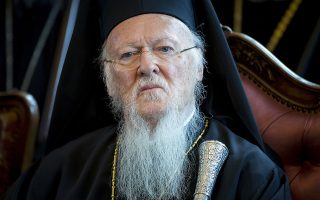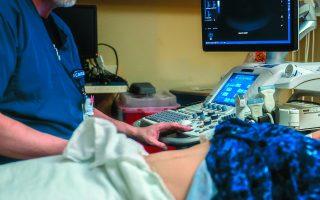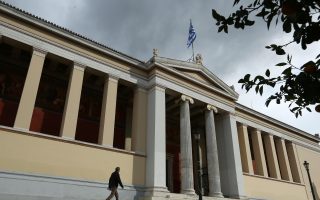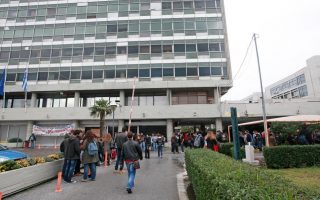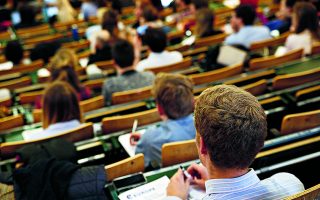Educating ‘the whole child,’ Pierce expands
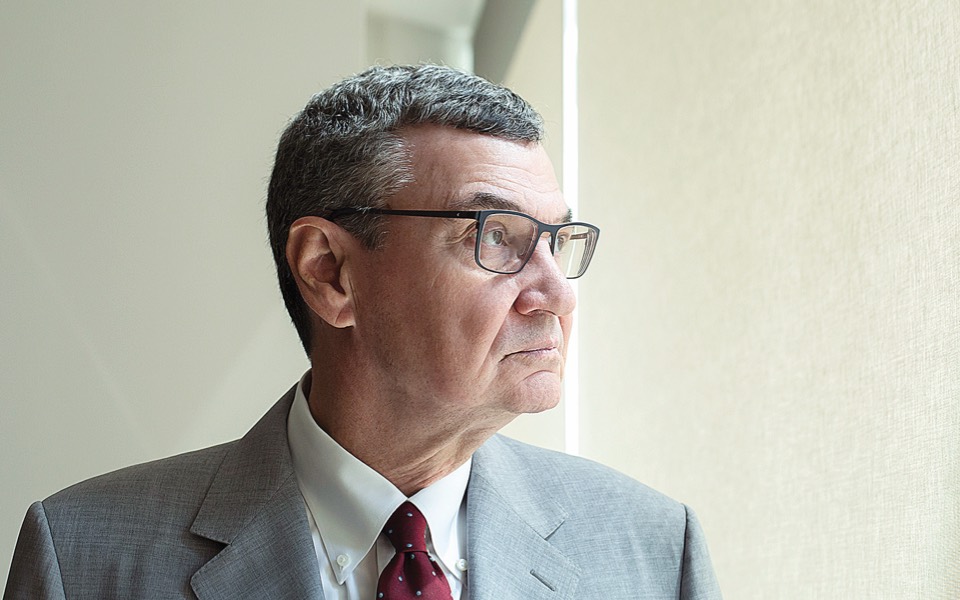
The American College of Greece (ACG) – Pierce has launched a new kindergarten and elementary school branch, its president, Dr David Horner, told Kathimerini recently.
Discussing ACG’s plans for the future, he adds that the possibility of adding a school of education at its Deree College for undergraduate and postgraduate education is also being considered. It would, he says, “utilize Pierce as a PK-12 ‘lab school’ for international education ‘best practices.’”
Could you give us an overview of Pierce’s history in Greece?
Pierce was founded in 1875 in Smyrna, Asia Minor by women missionaries from Massachusetts as a school for Greek, Armenian, Jewish and Turkish girls. The school came to Greece in 1923 at the invitation of Prime Minister Eleftherios Venizelos, following the Asia Minor Catastrophe. Originally located in Palaio Faliro, in 1932 the school moved to the Elliniko campus and in 1965 to its current location on Mount Hymettus in Agia Paraskevi. In 1984, to comply with a Greek government mandate, Pierce became co-educational. Today, Pierce functions as one of three divisions of The American College of Greece; Deree and Alba Graduate Business School are the other two divisions. Pierce enrolls over 1,600 students in gymnasium, lyceum and the International Baccalaureate Diploma Program. With the addition of the PK-Elementary School we envision a steady state Pierce enrollment of 2,400 students.
Why did you choose to launch a kindergarten and elementary school?
ACG’s attempts to optimize the performance and impact of each of our three education divisions, as well as the synergistic relationship between the three divisions. We believe the Pierce PK-Elementary School will strengthen Pierce’s position by offering parents (including Pierce/ACG alumni) the opportunity to choose Pierce as the preferred entry point for most Greek families, while preserving the option for other students (approximately 60%) to transfer from public and private schools to Pierce for Alpha Gymnasium. We are also considering adding a school of education at Deree, which would utilize Pierce as a PK-12 “lab school” for international education “best practices.”
The new division’s (and brand) promise is an experiential school, designed to help students develop their skills and nurture their talents. What does the school bring to the education process that sets it apart from other schools?
The mission of Pierce, which is rooted in the founders’ vision for the school dating back almost 150 years, is to provide a holistic education to form intellectually independent, morally responsible, socially engaged, globally minded citizens. Pierce focuses on educating “the whole child.” In addition to prizing academic learning, the social emotional learning and well-being of our students is of paramount importance. We seek to provide a learning environment that is both intellectually stimulating and emotionally secure for every student. Family engagement is a priority. Every child is viewed and seen for the strengths and opportunity each brings.
Our vision for Pierce is that 100% of our students will receive what each student needs to be successful. That includes great academic content, innovative and engaging pedagogy, and faculty, staff and parental collaboration so that every child sees himself or herself as a winner.
While explicit content is covered as mandated by the Greek curriculum guide, we also focus on the attainment of deeper knowledge and understanding on the part of our students. This encompasses providing authentic learning experiences in which students communicate, collaborate, think critically and practice good citizenship. An important aspect of preparing students as globally minded citizens is the ability to communicate fluently in other languages. Pierce’s historically strong English language curriculum has recently been re-engineered and, starting from the PK-Elementary School, will equip students with “English for Life.” The experiential program of the PK-Elementary School will be supported by state-of-the-art facilities: Laxanokipo, Makerspace, Fablab, Cooking Lab, Home Cinema, Ceramics Lab, Natural Sciences and Computer Labs, Art and Music Rooms, multiple open-air classrooms designed for outdoor teaching.
The school culture celebrates the development of strong and trusting relationships for students and fosters a “growth mind-set” in which students understand they haven’t learned everything “yet,” but recognize that they are learning and achieving every day.
Is admission to the new school dependent on the student’s family financial situation? Will scholarships be available at the elementary school?
Admission to the Pierce PK-Elementary School will be based on a family’s application and a meeting with school staff (including a psychologist) and the prospective student. If the student has been enrolled in another school, their academic record will be reviewed. The admission process is designed to assess students’ ability to perform in and benefit from Pierce’s unique set of resources and educational culture. Our goal is to make a Pierce education accessible for as many qualified students as possible. In a sense, every student attending Pierce receives a “scholarship” because our tuition and fees do not cover the full cost of education. The difference between what families pay to attend Pierce and the cost of education is provided by donations from alumni and friends of the College as well as support from the College’s endowment fund, which is approved annually by the Board of Trustees.
We offer academic and other performance-based scholarships for entrance into Pierce at Alpha Gymnasium. We also allocate funds to address special circumstances of financial need of gymnasium and lyceum families. The Pierce PK-Elementary School budget will also include provision for special circumstances of financial need, especially for families whose circumstances change after enrollment in the school.
What skills should a student possess these days?
We have developed a Pierce “Learner Profile” that reflects our sense of the habits, values, characteristics and skills that students will ideally possess to succeed and contribute in the 21st century. The goal of every aspect of the program at Pierce is to create students who embody the ethos of the Pierce mission (“to serve”) and who can take their place among the nearly 11,000 Pierce alumni who work in virtually every field of human endeavor.
Pierce students are educated to be leaders who are aware of global challenges, committed to working for justice, open in their thinking and able to communicate clearly, appreciative of the riches that diversity and equity bring, and able to develop unique and sustainable solutions to real world problems.
Pierce students are nurtured to be intellectually independent learners who are knowledgeable in a wide range of subjects, critical thinkers, creative, able to conduct their own research, excited by discovery and learning, and understanding of the complexities they will encounter in their studies, work, personal lives and broader society.
Pierce students are inspired to be resilient and hard-working, persistent and tenacious and brave, collaborative, honest, compassionate and empathetic, confident and influential personalities who act with a sense of moral and personal responsibility.
